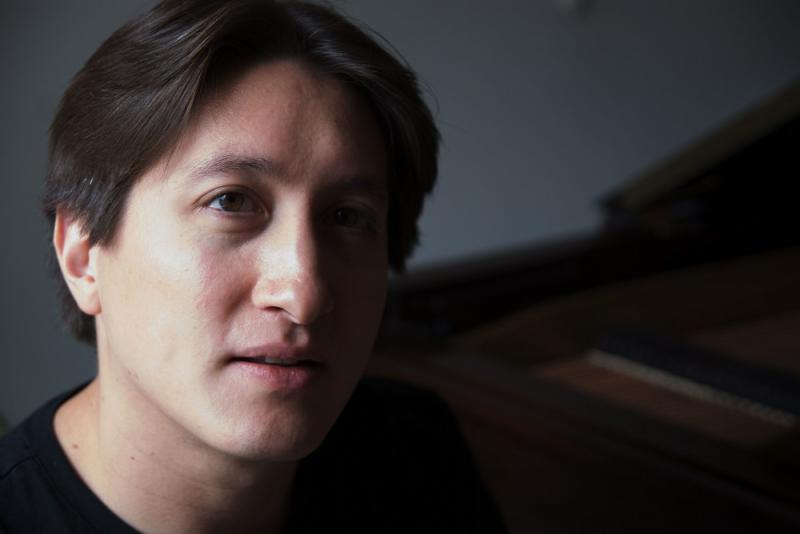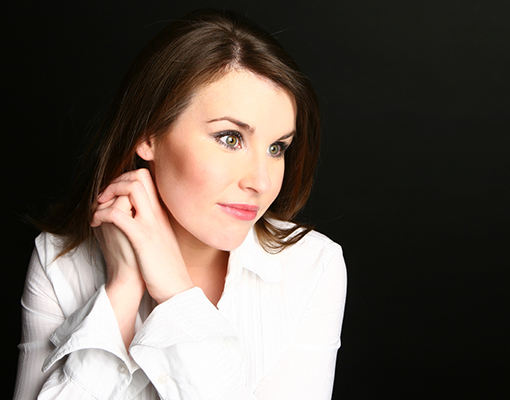Kempf, Devin, St Petersburg Philharmonic, Sinaisky, Symphony Hall, Birmingham review - aglow but not alight | reviews, news & interviews
Kempf, Devin, St Petersburg Philharmonic, Sinaisky, Symphony Hall, Birmingham review - aglow but not alight
Kempf, Devin, St Petersburg Philharmonic, Sinaisky, Symphony Hall, Birmingham review - aglow but not alight
Rich romanticism and spirited solos in Rachmaninov and Mahler

In the fourth performance of their UK tour, with Vassily Sinaisky replacing an indisposed Yuri Temirkanov, the St Petersburg Philharmonic gave a warm and rousing performance at Symphony Hall, Birmingham.
The orchestra’s interpretation of the work was certainly more rooted in the romantic era than the classical. Sinaisky’s conducting was unobtrusive, though by no means passive, as he led the orchestra in a sure, steady tempo. The opening of the third-movement Gavotte – marked non troppo allegro – was certainly not too fast but didn’t feel much like a dance, either. There was a cumbersome feel throughout that weighed down much of Prokofiev’s lighthearted jollity.
British pianist Freddy Kempf was the soloist in Rachmaninov's Third Piano Concerto. His dynamic playing saw to it that the work soared, bringing out a vast palette of colour from the keyboard. The first movement’s ferocious cadenza was particularly enriched, delivered with intensity and animation. The tone from the orchestra was equally opulent, with lower strings in particular adding serious beef. Dialogue between players and soloist was well balanced, the dark hues of a gorgeous, treacle-tinged tone perfectly suited to Rachmaninov's music.
 Closing with Mahler’s lyrical Fourth Symphony, the orchestra was on fine form, with thick brushstrokes from the strings, tight percussion and playful woodwind. Everything here moved towards an unusual finale, the song "Das himmlische Leben" (The Heavenly Life) with its naive text from the collection of German folk poetry Des Knaben Wunderhorn (The Boy’s Magic Horn). The first three, purely orchestral, movements, all have nods to the fourth’s song in some way; influences of nature and folklore also abound. Sinaisky rounded off the first movement’s jovial conclusion with a sparkling flourish before plunging the orchestra into the symphony’s eerie scherzo.
Closing with Mahler’s lyrical Fourth Symphony, the orchestra was on fine form, with thick brushstrokes from the strings, tight percussion and playful woodwind. Everything here moved towards an unusual finale, the song "Das himmlische Leben" (The Heavenly Life) with its naive text from the collection of German folk poetry Des Knaben Wunderhorn (The Boy’s Magic Horn). The first three, purely orchestral, movements, all have nods to the fourth’s song in some way; influences of nature and folklore also abound. Sinaisky rounded off the first movement’s jovial conclusion with a sparkling flourish before plunging the orchestra into the symphony’s eerie scherzo.
The third movement, marked "restful" began with rocking, dreamy string passages, though lost some stability towards the end. The navigation of Mahler’s complex harmonic landscapes felt laboured, and intonation turned sour a few times at the turning point of a modulation. Soloist in the symphony’s final movement was Irish soprano Anna Devin (pictured above), who sang with an easy clarity, conveying the innocence of the child singing of the heavenly vision. The text’s darker elements, though, could have been illuminated a little more. References to the first movement are heard in the fourth, and were equally spry, with keen brass and vivid strings. This was, for the most part, a solid performance, which certainly set the music aglow, though at times lacked the clarity needed to really set it alight.
rating
Share this article
The future of Arts Journalism
You can stop theartsdesk.com closing!
We urgently need financing to survive. Our fundraising drive has thus far raised £49,000 but we need to reach £100,000 or we will be forced to close. Please contribute here: https://gofund.me/c3f6033d
And if you can forward this information to anyone who might assist, we’d be grateful.

Subscribe to theartsdesk.com
Thank you for continuing to read our work on theartsdesk.com. For unlimited access to every article in its entirety, including our archive of more than 15,000 pieces, we're asking for £5 per month or £40 per year. We feel it's a very good deal, and hope you do too.
To take a subscription now simply click here.
And if you're looking for that extra gift for a friend or family member, why not treat them to a theartsdesk.com gift subscription?
more Classical music
 Presteigne Festival 2025 review - new music is centre stage in the Welsh Marches
Music by 30 living composers, with Eleanor Alberga topping the bill
Presteigne Festival 2025 review - new music is centre stage in the Welsh Marches
Music by 30 living composers, with Eleanor Alberga topping the bill
 Lammermuir Festival 2025 review - music with soul from the heart of East Lothian
Baroque splendour, and chamber-ensemble drama, amid history-haunted lands
Lammermuir Festival 2025 review - music with soul from the heart of East Lothian
Baroque splendour, and chamber-ensemble drama, amid history-haunted lands
 BBC Proms: Steinbacher, RPO, Petrenko / Sternath, BBCSO, Oramo review - double-bill mixed bag
Young pianist shines in Grieg but Bliss’s portentous cantata disappoints
BBC Proms: Steinbacher, RPO, Petrenko / Sternath, BBCSO, Oramo review - double-bill mixed bag
Young pianist shines in Grieg but Bliss’s portentous cantata disappoints
 theartsdesk at the Lahti Sibelius Festival - early epics by the Finnish master in context
Finnish heroes meet their Austro-German counterparts in breathtaking interpretations
theartsdesk at the Lahti Sibelius Festival - early epics by the Finnish master in context
Finnish heroes meet their Austro-German counterparts in breathtaking interpretations
 Classical CDs: Sleigh rides, pancakes and cigars
Two big boxes, plus new music for brass and a pair of clarinet concertos
Classical CDs: Sleigh rides, pancakes and cigars
Two big boxes, plus new music for brass and a pair of clarinet concertos
 Waley-Cohen, Manchester Camerata, Pether, Whitworth Art Gallery, Manchester review - premiere of no ordinary violin concerto
Images of maternal care inspired by Hepworth and played in a gallery setting
Waley-Cohen, Manchester Camerata, Pether, Whitworth Art Gallery, Manchester review - premiere of no ordinary violin concerto
Images of maternal care inspired by Hepworth and played in a gallery setting
 BBC Proms: Barruk, Norwegian Chamber Orchestra, Kuusisto review - vague incantations, precise laments
First-half mix of Sámi songs and string things falters, but Shostakovich scours the soul
BBC Proms: Barruk, Norwegian Chamber Orchestra, Kuusisto review - vague incantations, precise laments
First-half mix of Sámi songs and string things falters, but Shostakovich scours the soul
 BBC Proms: Alexander’s Feast, Irish Baroque Orchestra, Whelan review - rapturous Handel fills the space
Pure joy, with a touch of introspection, from a great ensemble and three superb soloists
BBC Proms: Alexander’s Feast, Irish Baroque Orchestra, Whelan review - rapturous Handel fills the space
Pure joy, with a touch of introspection, from a great ensemble and three superb soloists
 BBC Proms: Moore, LSO, Bancroft review - the freshness of morning wind and brass
English concert band music...and an outlier
BBC Proms: Moore, LSO, Bancroft review - the freshness of morning wind and brass
English concert band music...and an outlier
 Willis-Sørensen, Ukrainian Freedom Orchestra, Wilson, Cadogan Hall review - romantic resilience
Passion, and polish, from Kyiv's musical warriors
Willis-Sørensen, Ukrainian Freedom Orchestra, Wilson, Cadogan Hall review - romantic resilience
Passion, and polish, from Kyiv's musical warriors
 BBC Proms: Faust, Gewandhausorchester Leipzig, Nelsons review - grace, then grandeur
A great fiddler lightens a dense orchestral palette
BBC Proms: Faust, Gewandhausorchester Leipzig, Nelsons review - grace, then grandeur
A great fiddler lightens a dense orchestral palette
 BBC Proms: Jansen, Royal Concertgebouw Orchestra, Mäkelä review - confirming a phenomenon
Second Prom of a great orchestra and chief conductor in waiting never puts a foot wrong
BBC Proms: Jansen, Royal Concertgebouw Orchestra, Mäkelä review - confirming a phenomenon
Second Prom of a great orchestra and chief conductor in waiting never puts a foot wrong

Add comment